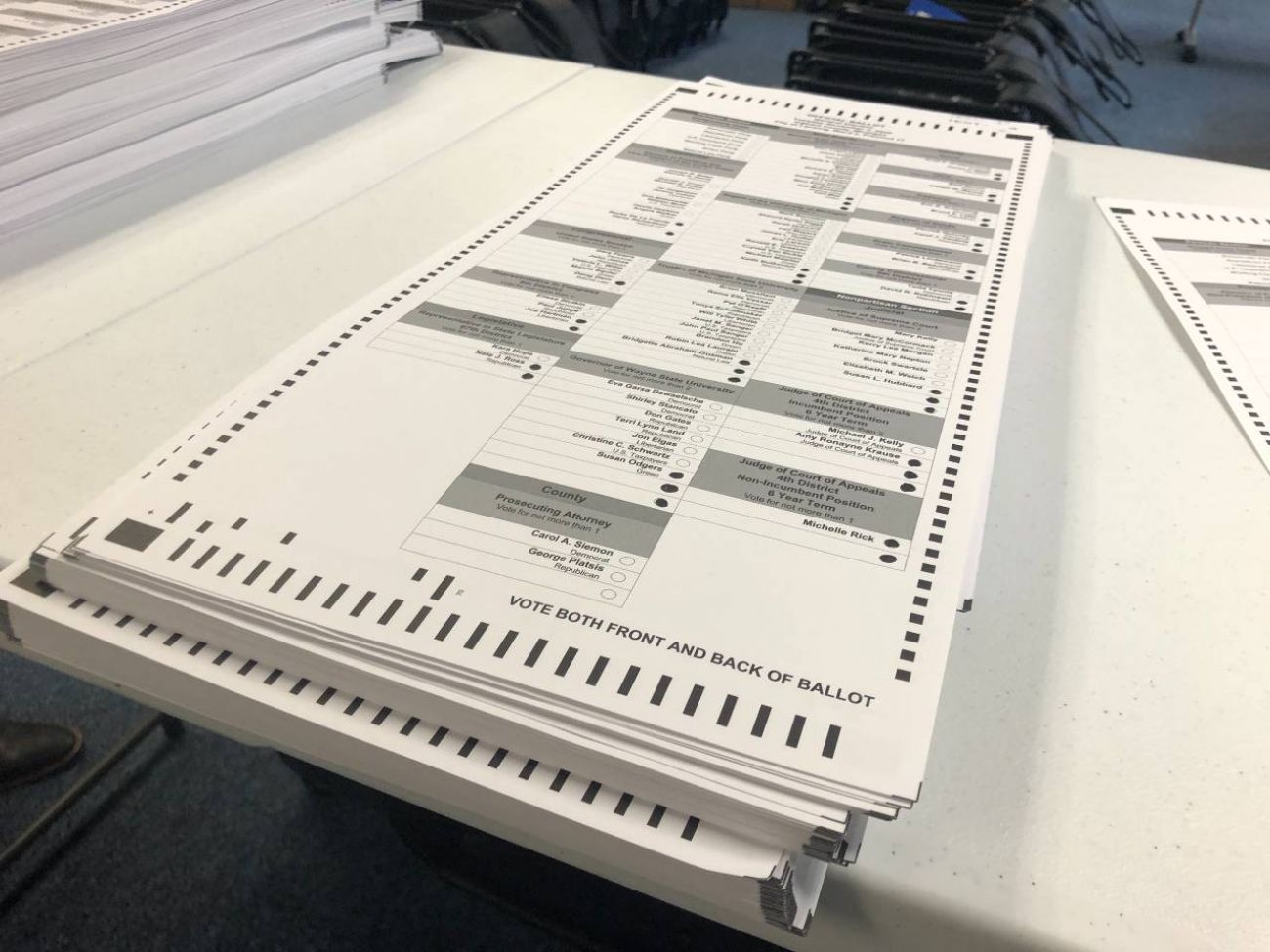What to know about Secure MI Vote initiative: security or suppression?

Oct. 14: Michigan GOP approves election reforms. Gov. Gretchen Whitmer’s veto is next.
Oct. 12: Michigan clerks: Read fine print of Secure MI Vote. It could ban volunteers.
Oct. 6: Michigan Senate passes bill to tighten election ID, absentee ballot laws
LANSING — Petitions to tighten Michigan voting and election laws could soon hit the streets after the Board of State Canvassers on Thursday granted tentative approval to an initiative by the Secure MI Vote committee.
The Republican group aims to collect at least 340,047 voter signatures to send its initiative to the state Legislature, where organizers expect GOP majorities will enact it into law, using a unique constitutional provision to circumvent a veto by Democratic Gov. Gretchen Whitmer.
Canvassers approved a 100-word summary of the petition on Thursday but held off fInal approval of the entire initiative until Monday.
Related:
- Michigan would join 'national popular vote' compact under ballot initiative
- Ballot drive, suits eyed to fight Michigan vote reforms blasted as suppression
- Republicans launch ‘secure MI vote’ drive to reform Michigan election laws
- Michigan AG, police to probe false election fraud claims after GOP report
The initiative is complicated and has many parts, so Bridge Michigan asked experts to weigh in.
Supporters, including a key Republican state senator who found there was no fraud in the 2020 presidential race in Michigan, say it shores up potential areas of abuse. Foes, including Democrats and progressives, say the reforms are part of a broader effort to suppress the vote by stoking unfounded fears about election security.
Here’s what the initiative would do, and what supporters and critics say.
Toughen in-person ID rules
Michigan already has a voter ID law, but the initiative would eliminate an affidavit option that allows individuals without an ID to cast a ballot if they sign a statement of identity under penalty of perjury.
Roughly 11,400 Michiganders signed an affidavit to vote in person without an ID in the 2020 election. That was 0.2 percent out of the nearly 5.6 million Michigan voters who cast ballots last year.
If the initiative is approved, in-person voters who forget their ID or do not have one could cast a provisional ballot that would not be counted on Election Day. It would only be counted if the voter returned to their local clerk's office with a valid form of ID within six days.
The initiative would also create a new "voter access fund" in state government and seed it with $3 million to provide free ID to voters who claim a hardship. Michigan charges $10 for an ID and already has a program to waive those fees for low-income residents receiving state aid.
Supporters say: It’s common sense.
Sen. Ed McBroom, R-Vulcan, who released a report in June that found no fraud in the election, noted that ID is required for many civic functions including air travel.
Polls show strong support in Michigan for the requirement, and 36 states have some form of voter ID requirement (although only seven have strict no-exception policies.)
“It seems like a very simple thing,” said McBroom, who is not involved in the Secure MI Vote initiative.
Critics say: This is a solution in search of a problem — and part of a national effort following the 2020 election by Republicans to make it harder to vote.
Ottawa County Clerk Justin Roebuck, a Republican, told Bridge Michigan the state’s existing voter identification law “is a great one, so what is the problem we're seeking to solve?”
“There's so little — I mean like none — evidence of voter fraud by impersonation, so that's where I struggle... It will be an inconvenience for our voters,” he said.
Other groups like the ACLU note that minorities are disproportionately impacted by ID laws, pointing to studies suggesting up to 25 percent of voting-aged Blacks lack government ID compared to 8 percent of white adults.
Require ID info for absentee ballot applications
The initiative would require voters to write their state ID number or the last four digits of their Social Security number on an application for an absentee ballot. If they do not, the voter would be provided a provisional absentee ballot, but it would not count unless they presented an ID in person at their clerk’s office within six days after the election.
Michigan does not currently require an ID or ID number for absentee ballot applications. Instead, clerks match signatures on the application against signatures they have on file for each voter, who previously provided an ID to register to vote.
Supporters say: A signature is not enough to thwart fraud.
“Signature verification is subjective,” said Jamie Roe, a GOP consultant who is spokesperson for Secure MI Vote.
Roe pointed out that anyone currently asking for an absentee ballot from the Michigan Secretary of State is required to provide both a driver’s license number and the last four digits of their social security number.
Critics say: The provision is an unnecessary burden on voters and clerical workers.
Mary Clark, a Democrat who is clerk of Delta Township, said the requirement would create additional provisional envelope ballots, which could lead to uncounted votes if they aren’t returned in time.
She said she’s also worried about the impact on seniors who have been on a “permanent” absentee list.
“And all of a sudden, they're going to have to notice on this application that there's a new requirement for their ballot to count,” said Clark, who is president of the Michigan Association of Municipal Clerks.
Barring unsolicited absentee ballots applications to voters
The initiative would prohibit the Michigan Secretary of State, local election clerks or any of their employees from "sending or providing access to" an absentee ballot application unless it is first requested by a voter.
Secretary State of Jocelyn Benson last year mailed absentee ballot applications to all Michigan voters, a pandemic-related decision upheld by federal courts. The initiative would not prohibit political parties, special interests or advocacy groups from sending absentee ballot applications.
Supporters say: Mailing unsolicited applications is “an unnecessary vulnerability,” since many go to the wrong address, McBroom said.
Critics say: The measure could reduce voter participation.
Roebuck, the Republican clerk, noted that third-party groups would still be allowed to mail unsolicited absentee ballot applications.
“There is no reason that an election official should not be able to do that,” he said, though he said he favors additional guidelines or disclosure requirements.
Prohibit private election funding
The initiative would bar the state or local election clerks from accepting any private money or in-kind contributions from outside groups to help them conduct elections.
Last year, a Chicago-based group called the Center for Tech and Civic Life sent “COVID-19 response” grants to clerks across the country, including to 465 Michigan municipalities. The grants went to Republican and Democratic clerks alike but fueled conservative complaints and lawsuits because the effort was funded by Facebook CEO Mark Zuckerberg.
The initiative would restrict election officials from accepting outside assistance. Instead, they could only use public funds appropriated by a governmental body for all election related activities, including equipment purchases, voter registration and informational mail.
Supporters say: Private funders or partisan groups could “pick and choose” which communities to help, said Roe of Secure MI Vote.
“Elections are an inherent role of government,” Roe said.
Outside private groups should not be able to help one community and not another. The language would not prohibit grants from state and federal government sources.
Critics say: Michigan is unique among many other states in that elections are locally administered by hundreds of villages, cities and townships — and smaller communities especially could use the help.
Clark said she used the $17,465 Delta Township received to buy an electric letter folding machine, a high-speed letter opener and security cameras on a new ballot box.
Clark noted that lawmakers often accept funds from nonprofits that aren’t required to disclose donors, which are dubbed “dark money.”
“When legislators stop taking dark money, then they're in a position to demand that clerks stop taking nonprofit money,” Clark said.
“I'm more concerned about votes being bought at the legislative level than I am about transparent money being received and spent at the local level.”
See what new members are saying about why they donated to Bridge Michigan:
- “In order for this information to be accurate and unbiased it must be underwritten by its readers, not by special interests.” - Larry S.
- “Not many other media sources report on the topics Bridge does.” - Susan B.
- “Your journalism is outstanding and rare these days.” - Mark S.
If you want to ensure the future of nonpartisan, nonprofit Michigan journalism, please become a member today. You, too, will be asked why you donated and maybe we'll feature your quote next time!




